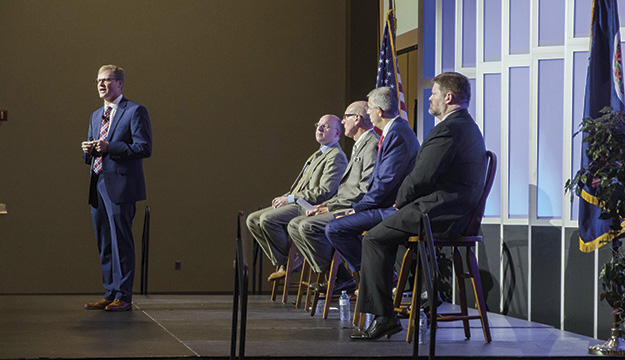Photo above: Travis Staton speaks as Stephen Moret, Steve Smith, Alan Levine and Scott Robertson look on.

Steve Smith talks about the benefits of joining the workforce at a
young age.
The CEOs of two of the region’s five largest employers have thrown their support behind a workforce development initiative designed to bridge the gap between education and employment in Southwest Virginia. Alan Levine of Mountain States Health Alliance and Steve Smith of Food City joined Travis Staton, CEO of the United Way of Southwest Virginia onstage at a leadership breakfast Sept. 27 at the Southwest Virginia Higher Education Center to introduce the IGNITE initiative to other business, education and community leaders.
“IGNITE is sparking interest in career opportunities by connecting schools and students with employers and employees through career development software, career guidance, soft skills training, a Careers Expo for Youth and Educators in Industy,” Staton said.
IGNITE was piloted last year in three schools, and this year is being offered to 29,000 students in 86 middle and high schools in 16 school districts, becoming the first region-wide workforce development initiative in Southwest Virginia’s schools.
Schools have been teaching valuable skills, Staton said, but employers are telling him those aren’t always the skills they need. “Just recently, one employer informed me that in the last quarter they hired 295 people, but lost more than 220 of them just to maintain a crew of 165. That company’s costs in administrative, recruiting and training time for loss of these new hires was more than $220,000 in one quarter alone.”
Staton cited a McKinsey report that said 70 percent of educators believe they are adequately preparing students for work, while only 50 percent of employers agree. “There is a gap between the worlds of work and learning in Southwest Virginia,” Staton said. “What’s needed is a true cradle-to-career continuum: a talent pipeline that prepares the next generation for the jobs of tomorrow.”
IGNITE seeks to address that need by focusing on two strategies: increasing awareness of local jobs and careers among the student population and furthering student development with real-world, hands-on workplace experiences.
“Imagine a Southwest Virginia where education pipelines help employers recruit high-caliber and diverse talent, where our region becomes known for the best workforce in America, and where our youth no longer need to leave the region to find a good job with a livable wage,” Staton said. “United Way of Southwest Virginia seeks to do just this. We are creating sustainable solutions to address the challenges facing tomorrow’s workforce, and we are uniquely and flexibly positioned to backbone these efforts and bring them to scale.”
Guest speaker Stephen Moret, president and CEO of the Virginia Economic Development Partnership praised the effort, pledging the Commonwealth’s support in workforce development in its rural areas. “We’re not going to judge Virginia’s success based on the Commonwealth as a whole, but on how each region does as well.”
Levine pledged $25,000 per year for the first five years of the program, which requires $250,000 per year, saying, “We have got to figure out how to come together and support the United Way and efforts like this to present these opportunities to our students. The time is now to invest in our future.”
The event was moderated by Scott Robertson, managing editor of The Business Journal of Tri-Cities, Tennessee/Virginia, which has supported the United Way of Southwest Virginia’s workforce development efforts in 2017 by running the Operation Tomorrow’s Workforce article series. “A united business community can be one of the strongest forces in any region,” Robertson said. “If the Business Journal can show our readers the benefits of joining in support of this effort, we are eager to do so.”




